The Outward: Definitive Edition is certainly “definitive” in terms of content but short of patches for several technical issues, it’s far from the definitive experience it should be on current-gen consoles. Developed by Nine Dots Studio and published by Prime Matter, it provides a janky but compelling survival-focused RPG – so long as you can deal with its unique approach to progression and death.
Talk, fetch, craft, maybe kill
It’s worth noting from the outset that Outward: Definitive Edition is no cinematic, narrative-heavy RPG with flashy cutscenes or dialogue-focussed skills. There is a fair amount of story content on offer, with four factions (one added in The Soroboreans DLC) that each gives a different viewpoint on the troubles plaguing the world of Aurai. Sticking with the open-ended sandbox design, most quests offer multiple ways to complete them – through exploration, crafting, or combat – ensuring you’re never forced into a particular playstyle. The Three Brothers DLC then extends the campaign by a further five missions with a settlement-building twist, but also introduces some mandatory combat. There are several repeatable side quests, but these simply exist to stock up on rarer supplies and can be ignored.
It’s never plain sailing in Outward, however. Each faction questline offers a parallel quest that can influence the difficulty of the final mission but many are timed and can be failed. Failing a quest never stops you from progressing the major questline but it can make the finale tougher, cut off trainers and storekeepers, or impart a permanent negative passive trait. It’s never as tough as it sounds as you don’t juggle multiple main quests and most give you 20 to 30-days to complete them. however, the high level of difficulty and death mechanics can throw a spanner into the best-laid plans.
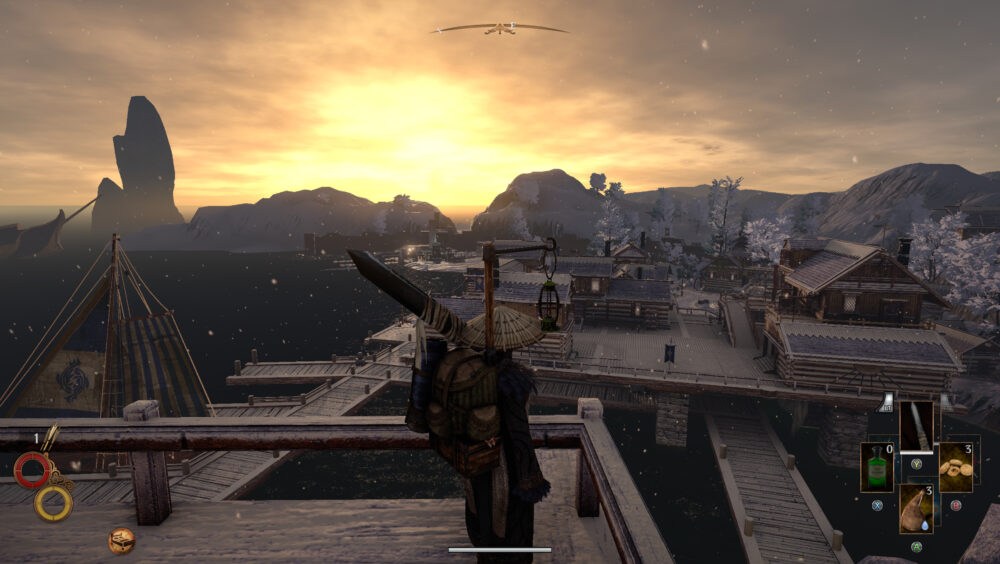
Don’t forget to pack your lunch
Outward: Definitive Edition is not a game in which general exploration, completing quests, and grinding combat grant experience that miraculously makes you more powerful. It’s all about generating and managing resources for cooking, alchemy, and forging; maintaining your thirst, hunger, and temperature levels; earning currency for skill trainers; carefully picking your approach to quests; and weighing up the necessity of combat. You’ll want to tackle the incredibly bland tutorial as it hammers home the point Outward is no simple hack-and-slash RPG with a multitude of survival mechanics that can be as unforgiving as the combat. Keeling over and dying of poisoning during the tutorial while I got to grips with the inventory – an action that doesn’t pause the game – was an enlightening moment.
If there’s one subjective downside to Outward, it’s that several elements feel deliberately convoluted – like having an equipped, pocketed, and backpack inventories – but these complexities serve to reinforce the fact that Outward is a game that rewards preparation even more so than skilful combat. As an example, your backpack – which you’ll want to constantly upgrade and always drop before combat – is a core part of the experience. The larger the backpack, the more you can store for long journeys or loot to sell in town; however, it also means you’ll move slower and drain more stamina when performing basic actions. Having a campfire, cooking equipment, an alchemy set, a quality tent, and a stockpile of supplies is useful when caught outside after dark, but travelling light and being able to outrun threats on the way to the safety of a settlement is just as important. The classic RPG urge to hoover up everything in sight is quickly tempered by your carrying capacity and immediate survival needs.
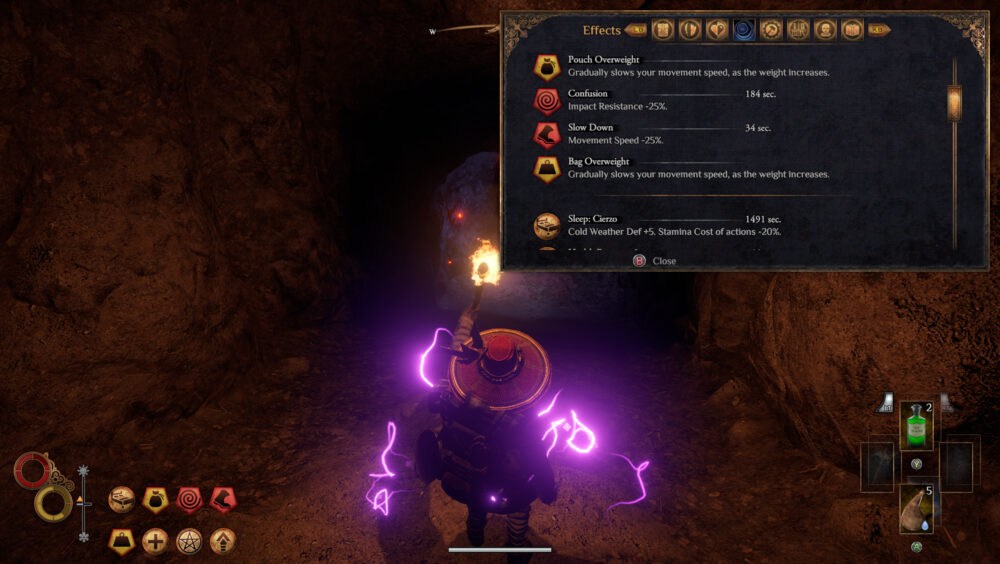
Do you like menu-ing?
Thankfully, Outward’s world is not so densely packed with locations and enemies that it’s overwhelming. It is big and lacks any fast-travel feature, ensuring you need to consider your trips carefully and the survival mechanics dominate much of the experience. Most enemies can be avoided through stealth or outrun, but you can’t escape thirst, hunger, fatigue, and the weather. You’re going to have to consider the value of clothing beyond its damage protection, prepare meals from raw ingredients to ensure they last longer, boil river water, and rest periodically to restore your maximum health and stamina bar. If you’re playing cautiously, it’s not as intrusive as it sounds as most positive buffs last for ages relative to short-lived negative status effects. Clothing can always be swapped on the fly and you’ll never starve or dehydrate so long as you’re content with a diet of berry jam and fresh water.
In addition to cooking, crafting and alchemy allow you to create basic gear – from campfires to low-tier weapons and armour – and create potions that restore your health and mana, or protect you from the elements. You can mash items together and hope for the best, or buy dozens of recipes from traders. Blacksmiths in each region have unique crafting options if you have the right resources (raw materials and silver), while trainers – who cover direct combat, stealth, and magic – will trade silver to teach you new weapon-based or passive skills. There’s not a massive amount of skills on offer but most upgrades are immediately impactful. You can invest in all the basic skills from a dozen or so trainers, but you’ll need to decide on which three to invest your “breakthrough” points to specialise further.
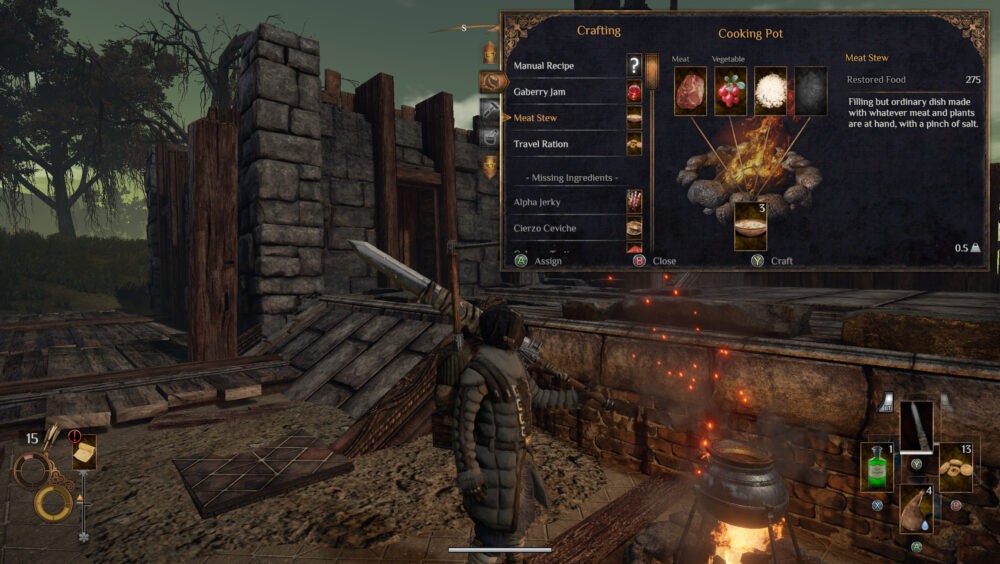
Stop stealing my stuff!
I’ve got this far without mentioning combat as it’s one of the weakest elements. You lock-on, you circle-strafe, and you consume stamina or mana while swinging your weapon, blocking, firing a bow, or tossing a spell. Your foes are not particularly well animated, damage feedback is poor, player attacks are easily disrupted, and the Outward: Definitive Edition has increased the default combat difficulty to prevent players from clearing dungeons and gaining overpowered gear too early. It makes it rough enough for melee characters to find a gap to strike, ranged characters are easily rushed down, while mages have to contend with a rune system that modifies basic spells so long as they remain in the casting zone (and standing still as a mage is rarely a good idea). The good news is most fights can be avoided and the base game has no mandatory boss fights – but you will eventually find yourself out at night, without a light source, running blindly towards a settlement, and stumble into something deadly.
There is no permanent death or reloading on the standard difficulty setting – in fact, Outward only offers autosave and save-on-exit functionality. The bad news is you have little control over what happens when you die. You get a brief text description and, in the best-case scenario, you could simply be dragged into a cave by predators or saved by a mysterious benefactor. However, you could also be stripped of your armour or weapons, have all your food supplies eaten by scavengers, be dumped on an island surrounded by toxic water, or find yourself on the opposite of the map from a settlement at night. In these situations, it’s possible to trigger a negative feedback loop that sees you dying over and over again before getting back on track several game days and real-time hours later. It’s an event that can break the pacing.
If you’ve got a reliable companion to join you, I’d strongly recommend you try the online or split-screen coop. Having a second player present provides way more tactical options if you engage in combat – especially if you pick complementary playstyles – and provides some much-needed banter during longer overland journeys.
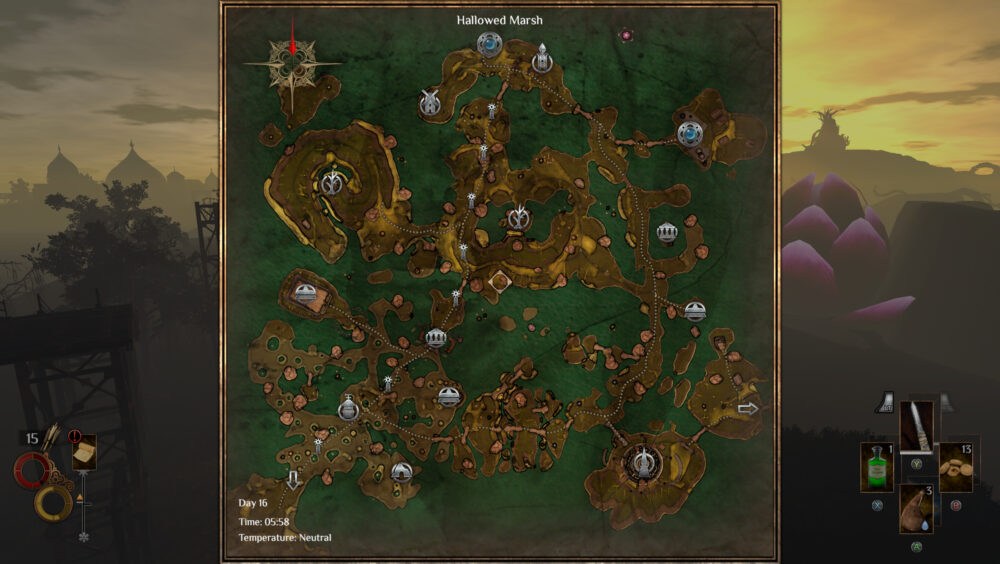
At least the lighting is pretty
Despite the “definitive” label, Outward: Definitive Edition is a dated-looking game with some distinctly janky elements like unnaturally large structures, stiff animations, and unexpressive dialogue that takes place with the camera pulled back. Environments aren’t particularly detailed, but they’re diverse, and vibrantly colourful, while overblown lighting and real-time shadows make spelunking by torchlight or sunrises/sunsets look great. Daytime jaunts are a combination of sweeping vistas and epic music, while the nights are oppressively dark. No matter what time you’re out, there are periods of heavy ambience and deep silence that reinforce the sensation of being alone and vulnerable. What the Outward: Definitive Edition may lack in visual flair, it makes up for with an impressive scale, immersive atmosphere, and catchy soundtrack.
On average, the performance felt solid and stuck close to the 60fps target – making for much smoother-looking and more responsive combat than the last-gen release. Mercifully, loading times are often only a third what they were on the last-gen consoles and almost instantaneous when entering interior locations. I’ve not experienced any character progress or quest progression bugs some have, but on all current-gen consoles, there’s a complete lack of v-sync and full-screen tearing. It’s less noticeable in darker areas but creates an unpleasant “wobbly” appearance whenever there are high-contrast light sources present in the environment.
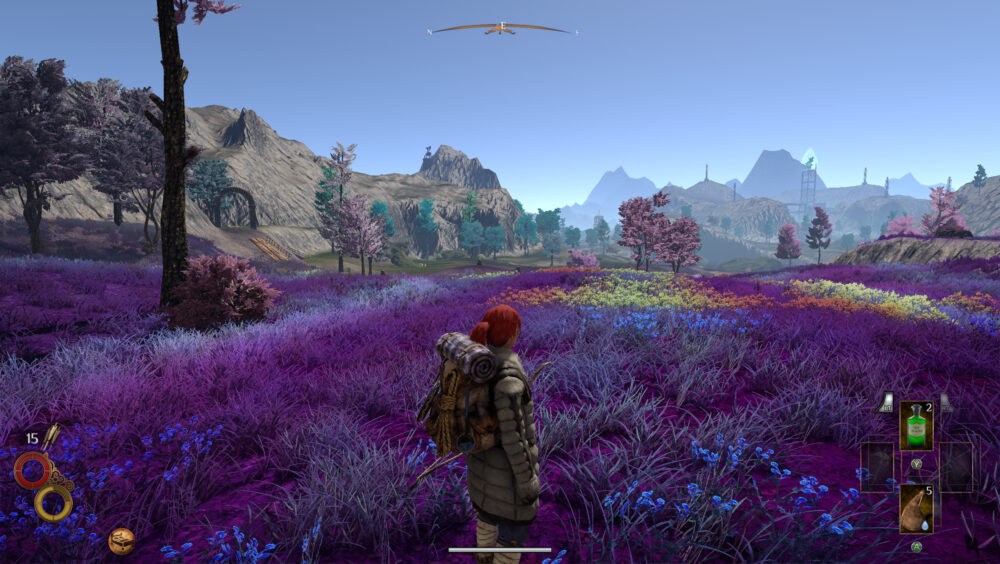
A few patches short of janky perfection
If you’re someone who enjoys European-style RPGs – heavy on their systems at the expense of cinematic storytelling and high production values – Outward: Definitive Edition should be on your radar. It takes some time to readjust to its resource-based progression systems, wonky combat, and somewhat random death mechanic, but it’s one of the few RPGs that make simple traversal part of the challenge and immensely satisfying to pull off. It’s a game that rewards you based on the effort you put in, rather than leading you along a scripted path with your power growing at set intervals. That said, I’d wait on a few patches to resolve some technical issues before diving in.
Developer: Nine Dots Studio
Publishers: Deep Silver, Koch Media
Platforms: PlayStation, Xbox, PC
Reviewed on the Xbox Ecop System of Gaming Console Xbox One, Xbox Series X/S
Enjoy the review? want to read more of our reviews? then click right here to be whisked away to the realm of our opinions.

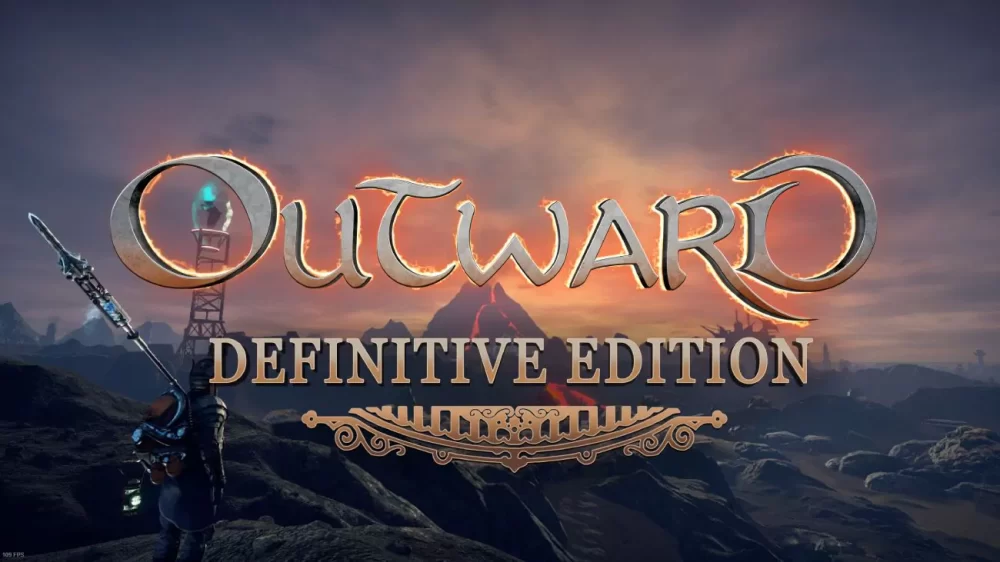






You must be logged in to post a comment.